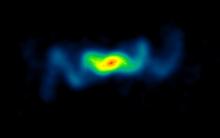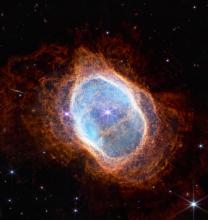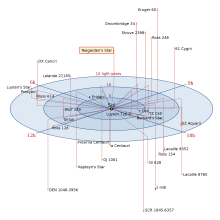Listen to today's episode of StarDate on the web the same day it airs in high-quality streaming audio without any extra ads or announcements. Choose a $8 one-month pass, or listen every day for a year for just $30.
You are here
Delta Cygni
The celestial swan climbs high across the southern sky on summer nights. It’s marked by its bright tail, the star Deneb, which is the lower left point of the wide-spread Summer Triangle. The swan’s body angles to the upper right of Deneb, as though the swan were taking off from a pond. Its long, graceful wings flank the swan’s body.
The brightest star of the top wing is known as Delta Cygni. It’s a system of at least three stars. Two of them are a good bit bigger, brighter, and heavier than the Sun, while the third is less massive than the Sun.
The two heavier stars orbit each other at an average distance of almost 15 billion miles — roughly 150 times the distance from Earth to the Sun. But the little guy is much farther out.
It’s possible that when the system was born, the third star was closer in. But as the stars danced their complex orbital ballet, they swapped some of their energy. The lightweight star was pushed outward, while the heavier stars spiraled closer together.
Those stars were pushed into a stretched-out orbit that looks a bit like an oval racetrack. It takes the two stars almost eight centuries to complete one lap around that track. But the lonely third member of the trio needs a bit longer. It takes many thousands of years to orbit its brighter companions.
Look for Delta Cygni above Deneb as darkness falls. It’s about a third of the way up from Deneb to brilliant Vega, the brightest member of the Summer Triangle.
Script by Damond Benningfield





